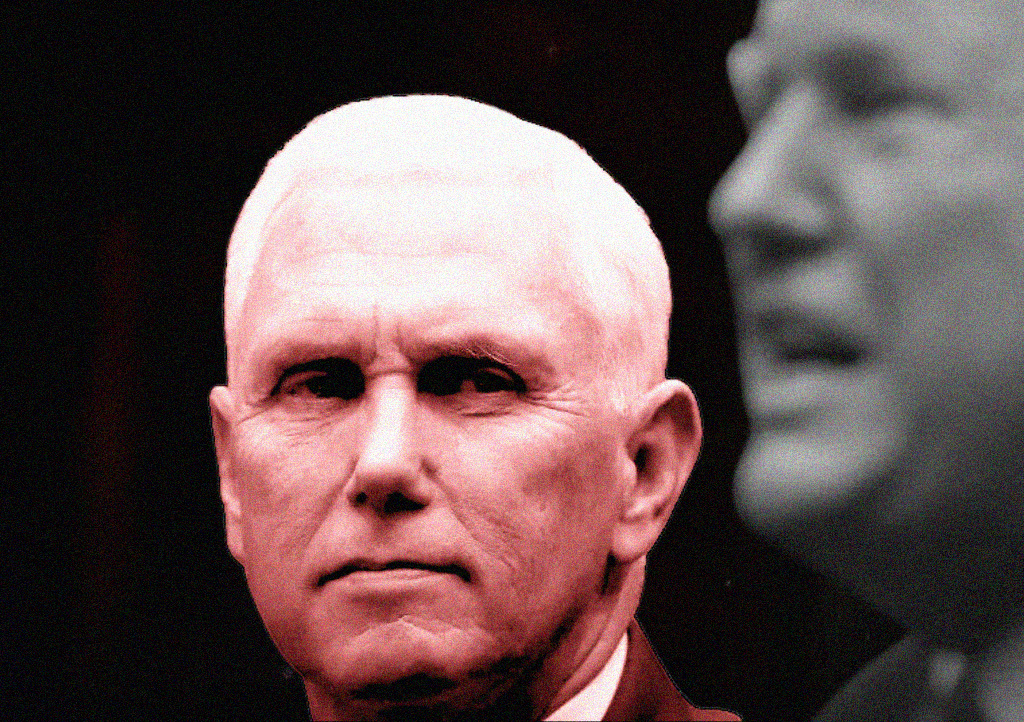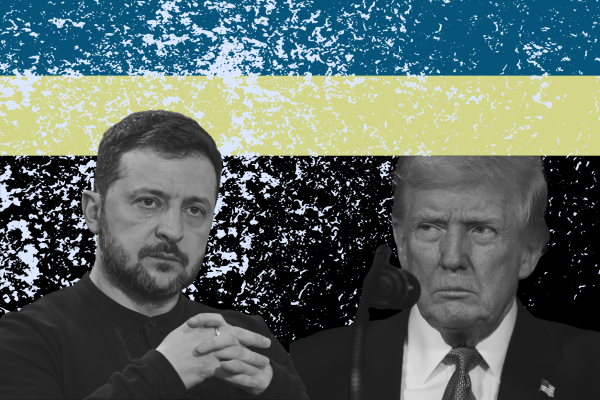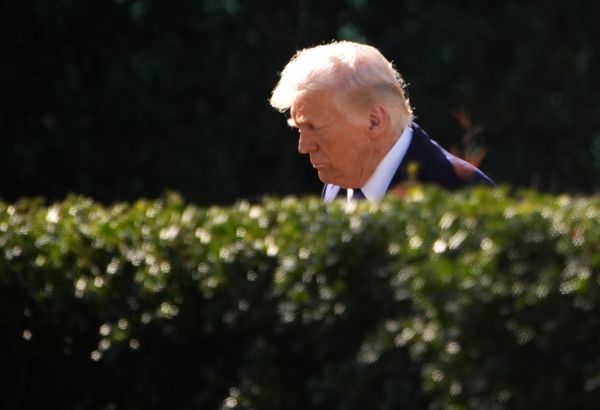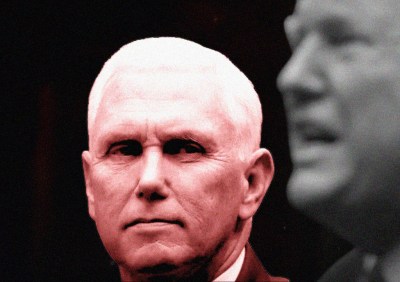It’s a sign of the times that Mike Pence can make news with pronouncements that a decade ago would’ve been about as controversial as saying that the sky is blue.
“Mr. President, Ukraine did not ‘start’ this war,” Donald Trump’s former vice president posted on Twitter February 19. “Russia launched an unprovoked and brutal invasion claiming hundreds of thousands of lives. … The Road to Peace must be built on the Truth.”
Later that day, Pence spoke to The Dispatch in the offices of Advancing American Freedom, the political organization he launched after leaving office in 2021, about how he sees his mission in politics for the next four years. “Our role here is really just to promote a broad, mainstream conservative agenda at home and abroad,” Pence said. “The president may simply have misspoke … but facts matter, and that’s why I weighed in today.”
A Pence aide told The Dispatch after this story was published that “the refusal of numerous members of the administration and the president to acknowledge that Russia had started the war confirmed Pence’s initial concern” that the president’s first comments were not a misstatement.*
Since Trump was elected to a second term, Pence has proven himself to be one of the last remaining institutional voices of traditional conservatism in a party and movement willing to go along with whatever Trump wants. Beyond calling for continued U.S. support for Ukraine to repel the Russian invasion, Pence and AAF have urged the implementation of the law requiring TikTok to divest from Chinese ownership, while Trump has tried to give TikTok a reprieve. When Trump posted on social media that “He who saves his Country does not violate any Law,” Pence posted his essay from 2010 on the importance of adhering to the Constitution. Perhaps most notably, less than a day after Trump named Robert F. Kennedy Jr. as his pick to be secretary of health and human services, Pence urged senators to vote “no.”
The notion that Kennedy, an anti-vaccine conspiracy theorist and trial lawyer with a far-left record on abortion and health care reform, should not be the country’s top public health official would have been obvious to almost all Republicans a decade—or even a year—ago. But in Trump’s Washington, Pence stood almost alone in his campaign against Kennedy. He spoke directly to multiple senators urging them to vote against Kennedy. But in the end, Mitch McConnell, the former Senate majority leader, was the only Republican in the chamber to vote “no.”
“I was disappointed that we didn't have more company in the end. I will tell you that the chorus of voices that reached out to us offering quiet encouragement was fairly deafening,” Pence told The Dispatch. “People appreciated the stand that we took and the case that we made, and the way we equipped members of the Senate with not just the life issue, but now-Secretary Kennedy’s long record of liberal activism.”
In a separate interview, Tim Chapman, the president of Advancing American Freedom, told The Dispatch that the message he heard privately not only from activist groups and donors but also senators themselves was: “You guys are right. We appreciate you’re doing it. We just can’t be there with you right now.”
The reason? “If they pop their head up, they get their head taken off on Twitter,” Chapman said.
“We don’t necessarily feel an obligation to win every policy fight that we engage in, but we do feel very strongly that we have an obligation to raise the issues and that there is a benefit downstream from that, even if you lose,” Chapman added. “I actually believe that RFK Jr. is going to be more pro-life at HHS because we raised the issue, and I think he’s on a shorter leash on that particular issue.”
Chapman said his thinking about the role of Advancing American Freedom is informed by his time working for nearly 15 years at the Heritage Foundation and its advocacy outfit Heritage Action before leaving Heritage in 2020. With only 16 employees focused on an array of issues related to policy and legal advocacy, Advancing American Freedom is just a fraction of the size of Heritage but hopes to punch above its weight. When the conservative movement was “at its best, it has tried to pull [GOP] leadership more to the right and tether them to principle on different debates.” Chapman observed that while Heritage sought during Trump’s first term to synthesize conservatism and populism, under pressure from the likes of Tucker Carlson it simply threw in the towel and became “more of a populist enforcer of the MAGA agenda, rather than a principled and independent outside organization trying to pull them to conservative true north.” Chapman now hopes to fill that void left by the Heritage Foundation.
But don’t expect Pence to join the anti-Trump Resistance anytime soon. Or ever. “I do think the administration is off to a good start with the Cabinet overall,” Pence told The Dispatch on February 19 when asked for the best and worst aspects of the first month of Trump’s second term. “I think the best things are reinstituting the policies that we had in effect at the southern border, and taking the strong stand that they have on the cartels, the collaboration, even the cooperation, with the Mexican government,” he continued. “A close runner-up is I’m very impressed with what my friend Elon Musk is doing with the Department of Government Efficiency. Identifying wasteful government spending and outright fraud is a great first step” that ought to be followed by congressional action.
And the worst parts of the last month? Pence takes a long pause. “I've had some issues with some personnel, and been disappointed in that, but … overall, President Trump and the administration are off to a good start,” he said. “Our goal here is to really be a constructive, credible voice for conservatism.”
What’s the point of Pence making the case for traditional conservatism when the man leading the Republican Party has such personal animosity toward him over his decision to fulfill his constitutional duty to count Electoral College votes on January 6, 2021? “The conservative agenda’s been the calling of my life,” Pence replied. “While the most prominent voice in our party occasionally signals a different direction … I’m not yet convinced the president is interested in departing from the agenda that we governed on. But some of those prominent voices in and around the party would take us in a more populist vein. I don’t believe that’s what most Republican voters believe.”
On the personal level, it’s no secret that Trump and Pence’s relationship has been virtually nonexistent since Trump inspired a mob to ransack the U.S. Capitol and rioters shouted chants to hang Pence. “We don't talk as often as we used to,” Pence said. “In fact, we’ve only spoken once in the past four years.” At the funeral for Jimmy Carter on January 9, Pence and Trump had what he described as a “cordial exchange” with Trump: “He greeted me. I stood up, extended my hand, and I said, ‘Congratulations, Mr. President.’ He softened and said, you know, ‘Thanks, Mike.’”
Still, Pence thinks he can have influence with the president again. “While we don't talk the way we used to, I have every reason to believe he still listens to me,” Pence added.
And he had advice for those inside the administration hoping to influence Trump in a more traditionally conservative direction: “I have great confidence in Secretary of State [Marco] Rubio and the National Security Adviser Mike Waltz. I just encourage them to take the opportunities to offer clear, quiet counsel, because in all my years of experience with President Trump … he does listen. He takes in a variety of viewpoints, but I think he appreciates people who are candid and forthright with him, even if it doesn't necessarily square with the position he appears [to be] intending to take on any given issue.”
While Vice President J.D. Vance is obviously pushing against much of the agenda that Pence supports, Pence at first had only praise for the new vice president when asked for his opinion of Vance’s first month in office. “I thought he gave a very good speech at the Munich Security Conference, speaking about shared values,” Pence said. “I appreciated him talking about … particularly efforts against pro-life people in the U.K. and suppression of free speech in Europe.” Pence went on to note he “mostly focused on Russia, and notably China” when he spoke at that security conference. “The great challenges that we are facing in the world today really require the president and the vice president to focus energy on standing with our allies and standing up to our enemies,” he said.
Asked if he expects Vance to be the 2028 GOP nominee and whether he could support him, Pence suggested there will be a seriously contested primary. “I pray often for the president and the vice president. I don't know the vice president personally, and he was a pretty harsh critic of our administration during our four years, and only emerged in politics after we’d left office,” he said. “The Republican party has a deep bench. We have a lot of men and women of great talent … Over the next four years, we’re going to be faced with a very important choice, whether we stay committed to our traditional conservative path of strong national defense, American leadership in the world, limited government, fiscal responsibility, right-to-life and values, or whether we follow the siren song of populism unmoored to conservative principles.”
While Pence sounds like a man saying the sky is blue when describing the current GOP’s inconsistencies with long-held Republican principles, he begins to sound more like a man who says clouds are made of marshmallows when discussing what he thinks the party will look like going forward: “I have a sense that the Republican nominee in the next election will be someone who embraces that traditional Republican conservatism.”
Is there a chance Pence himself might run for president again in 2028? “I never say never.”
Editor’s Note, February 24, 2025: This story has been updated with an additional comment from a Pence aide.







Please note that we at The Dispatch hold ourselves, our work, and our commenters to a higher standard than other places on the internet. We welcome comments that foster genuine debate or discussion—including comments critical of us or our work—but responses that include ad hominem attacks on fellow Dispatch members or are intended to stoke fear and anger may be moderated.
With your membership, you only have the ability to comment on The Morning Dispatch articles. Consider upgrading to join the conversation everywhere.